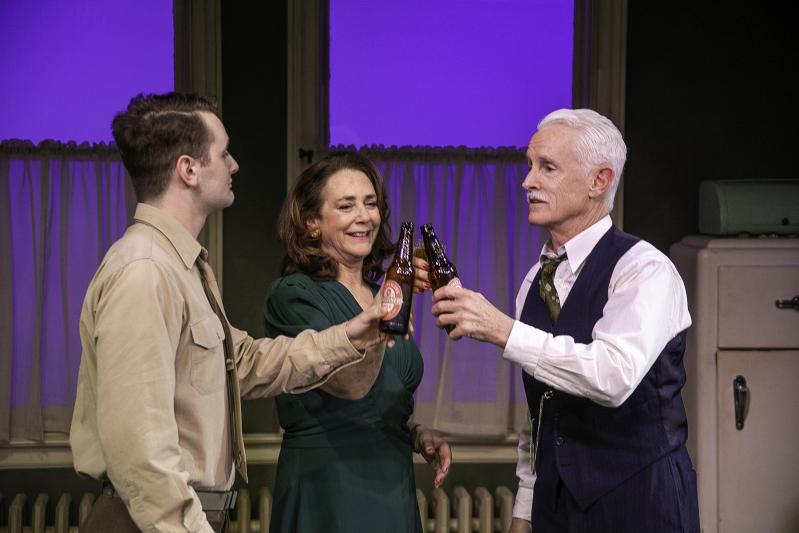Have you ever wondered what it would be like to be a fly on the wall in the home of an average American family? To see how they feel behind closed doors? Take your seat in the Bay Street Theater's production of "The Subject Was Roses," and you won't wonder any longer.
It can feel awkward watching this production, as if you're seeing something you aren't meant to see. We imagine the perfect family to be loving, honest, and open with each other. Unfortunately, no family is perfect, and that truth can often be harsh and uncomfortable.
Walking away from the theater, I was left with questions that were unanswered, plot points unresolved, and a yearning to know what was next for the Cleary family -- but no question in my mind at all that this is a don't-miss-it production.
Written in 1964 by Frank D. Gilroy, "The Subject Was Roses" stars John Slattery, his wife (for real), Talia Balsam, and their son, Harry Slattery, as John, Nettie, and Timmy Cleary. The year is 1946, Timmy has just returned from World War II, and the show is set throughout in the kitchen and living room of their West Bronx apartment.
This story could take place at any time, today included; the dialogue is timeless. The details, be they technological or societal, are almost incidental. The strength of the story is in the intense and quite real dynamics among the actors.
They work, as a family, in perfect symbiosis. In the first act, the tension increases scene by scene. There's a veneer of congeniality as the three try unsuccessfully to fit their former give-and-take into their new reality. Changed by the war, Timmy is not a child anymore, to the occasional displeasure of both parents.
Harry Slattery brings a wonderful, worldly, youthful power to his performance. Timmy spent two years overseas, and Mr. Slattery the younger carries those experiences on his back through every scene. His father's John Cleary, for his part, has worked selling coffee almost his entire life, and barring a few business trips down to South America, he has never traveled or explored the world, surely not as his son has been forced to.
John Cleary, in Mr. Slattery's highly nuanced performance, is a man pulled between who he feels he should be -- the classic, almost stoic, 'man's man' of the postwar era -- and who he is: a loving man who wears his emotions on his sleeve. These paradigms are constantly fighting within him, and when the devil on his shoulder wins, he says or does something harsh. Watch Mr. Slattery's face in these moments. He plays it like he knows he's wrong but can't help himself.
The heart of the show, without a doubt, is Ms. Balsam, as Nettie Cleary, who's the last to admit that there's a new family dynamic but the first to adapt to it. Her relationship with her husband is strained -- probably more and more, ever since their son left -- and when he comes home, she expects it to be just as it was when he left. Watching Ms. Balsam is like watching a fire start: There are sparks and embers before the flames ignite. This culminates in the second act, where she sits down with her son and shares her truth with him.
Her story is not easy to hear -- the truth often isn't. Family are often supposed to be the people who know you best, therefore you can't hide anything from them. This production breaks down that falsehood and brings us to reality.
"The Subject Was Roses" runs the emotional gamut. It's genuine, real, funny, heartfelt, heartbreaking, and in the end, simply human. It's funny one minute, shocking the next; touching, always. Father, mother, son -- all wear their hearts on their sleeves, and all come face to face with their own truths. Watching it, you may actually feel intrusive, and be left a bit melancholy, but maybe also a little better for it.
The play is directed by Scott Wittman, with scenic design by Derek McLane, costumes by Laura Bauer, lighting by Cha See, sound design by Hidenori Nakajo, music by Marc Shaiman, and stage management by Michelle Bosch. It will run through June 16, daily except Mondays.
Tickets range from $49.99 to $126.99; showtimes vary and can be found on the theater's website. Conversations between the creative team and the audience will follow next Tuesday's performance.




